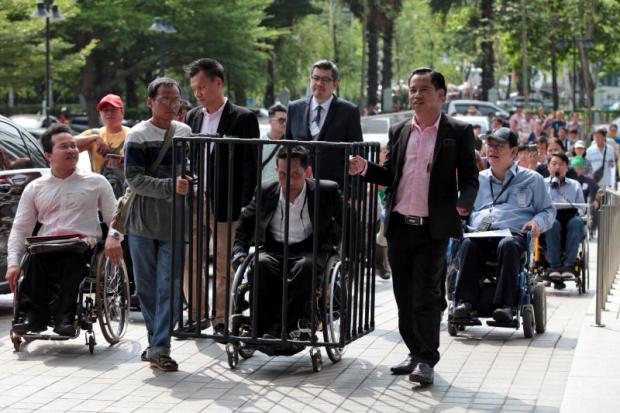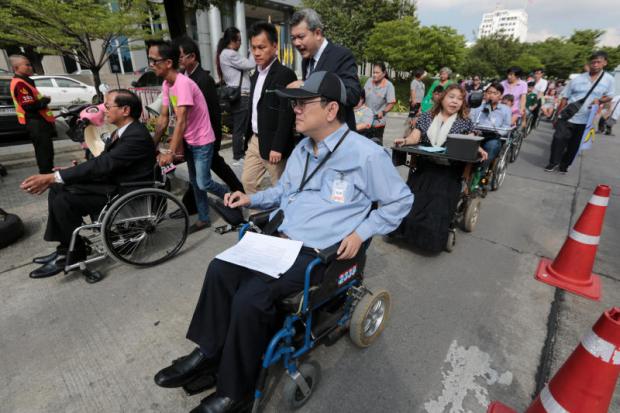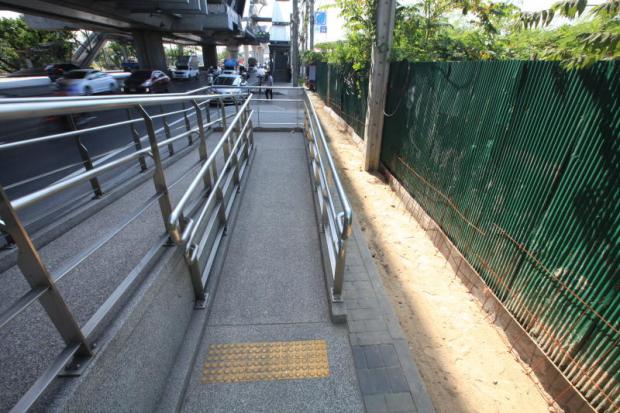
Thailand is marching toward the golden age of mass transportation. The government is developing a number of subway and skytrain projects in the capital, trams in big cities like Phuket, Chiang Mai and Khon Kaen, and at the intra-provincial level, the country's first high speed train from Bangkok to Nong Khai.
Questions arise. Is the fancy infrastructure made for all, or just young able-body commuters? Are these mass transit stations designed and built with universal design concepts in mind that make them responsive to people with physical limitations such as the elderly and disabled people?
The concept of "universal design" is the design and composition of an environment so it can be accessed, understood and used to the greatest extent possible by all people regardless of their age, size, and ability.
The question is worth asking because the infrastructure of mass transit in Thailand has been known for being unfriendly to disabled groups or even elders, a group which is becoming more numerous as the population ages.
Look no further. BTS skytrain, the country's first skytrain, is a prime example. The service operator still receives complaints from disabled groups about the shortcoming of its infrastructure designed to serve disabled groups such as inadequate, narrow ramps and hard-to-access elevators.
Disabled groups have sued the Bangkok Metropolitan Administration (BMA), the state concessionaire, several times for failing to provide facilities to accommodate disabled commuters.
Despite the BMA dragging its feet to upgrade infrastructure, some good signs are emerging in terms of national policy. Last year, the Ministry of Transport hired a consultancy to study a masterplan on how to make the country's mass transit infrastructure responsive to elders and disabled groups.
The study is part of the cabinet order on Feb 28, 2017, calling for a national masterplan and universal guidelines for construction and services at mass transportation stations.
Dubbed as "We Make The Best For All," the study is funded by The Office of Transport and Traffic Policy and Planning (OTP), a state think-tank on mass transit and transportation policy.
OTP hired a consultant firm, the Sea-Consult Engineering Company, with a 37 million baht budget for the job. The study started last year and will wrap up in March.
When finished, it will serve as guidelines for interior design and construction of mass transit stations.
In September last year, a first round of hearings was held in Bangkok where disabled groups, educational institutions, professional associations and other stakeholders gave their views.
Transport Minister Arkom Termpittayapaisith also attended.

MAKING A POINT: Manit Intharapim, chairman of 'Rail System Accessibility Transportation For All', (in the cage) led a group of disabled people to file a complaints at the Administrative Court in May last year.
"The master plan will be put into practice. It is not just a study. Our strategy is to develop facilities in the sector for people with disabilities and the elderly. The next step is to complete the study and turn it into a masterplan. Then, we will set a timeframe. The first phase is over five years when we will provide a clear action plan, but eventually we will have a 20-year timeline," he said during the opening.
"The government needs to see whether our airport, piers, and train stations already have facilities that can cater to different groups with different needs. They are not just commuters," said Mr Arkom.
He said the cabinet and ministry this year will propose a budget for projects with priority. "Another task ahead is the Transport Ministry and Interior Ministry have to work together to draft related laws," he said.
Apart from the masterplan on infrastructure, the work also includes guidelines on developing personnel and services to make the transport system responsive to elders and disabled groups, Chaiwat Tongkamkhun, director of the OTP, added.
"The origin of this masterplan comes from the fact that Thailand is an ageing society and at the same time, the number of disabled is also on the rise," he said. According to the United Nations, Thailand is the world's third most rapidly ageing country. The percentage of Thais aged 65 or older has more than doubled over the last two decades, from 5% in 1995 to 11% in 2017.
There are 1.9 million disabled people in the country, according to the Ministry of Social Development and Human Security. This group is expected to increase by 100,000 people annually.
Manit Intharapim, chairman of "Rail System Accessibility Transportation For All," a civic group of disabled people, welcomed the government's masterplan initiative.
"It is time for government to look at the problem, which goes back a decade or more. The government should not just focus on building more railways and trains," he said.
Mr Manit has been at the spearhead of efforts to sue the BMA for failing to provide infrastructure for disabled groups and elders.

RAMPING IT UP: Disabled groups complain the mass transit operator has failed to consider disabled groups when they built infrastructure.
"People with disabilities have worked with all types of government agencies about fixing this problem, since before the construction of the BTS. Finally, we need to take legal action," said Mr Manit.
Among 1.9 million disabled people, over 800,000 are aged 15-60 but only 271,916 of them work, according to the Ministry of Social Development and Human Security.
A good mass transit system is one factor that can increase the rate of their employment, helping the disabled get out of their homes, enjoy social life, and find jobs, Mr Manit said.
"We want to create a good quality standard of access for everyone. We want to make Thailand a showcase of people having equal rights to travel," he said. "We want people with disabilities to be able to travel each day like able-bodied people.
"If we are unable to achieve this, and people find travel difficult, our lives will be held back in other ways.
"It takes a lot of effort and physical strength for the disabled and elderly to leave home compared to other people. Everyone in society wants to be treated fairly and enjoy the same rights and equality no matter what condition their bodies are in."